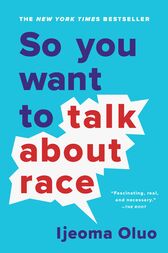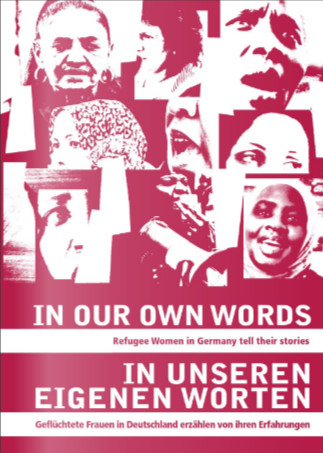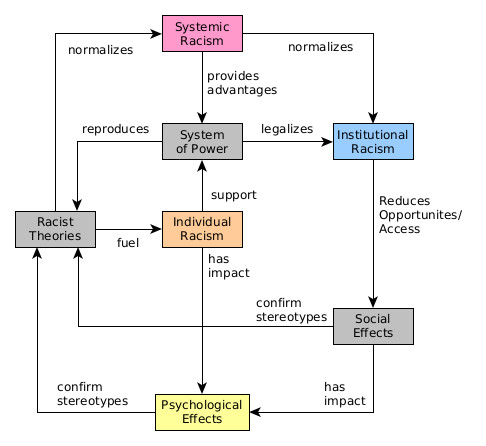Racism
I'm white. I don't know how racism feels. I can't know because I'm not experiencing it. I only know what BIPoC (BIPoC stands for Black, Indigenous, and People of Color) friends tell me from their experiences. So why do I want to write about Racism?
Motivation and Information
- It should not be the responsibility of BIPoC to explain racism to white people - dealing with all the discrimination is already bad enough. So white people should educate themselves.
- White people need to reflect on their privileges to understand all the racism-related power dynamics and to be an ally for BIPoC.
- The patterns of oppression inherent to racism repeat themselves in other forms of oppression like sexism, heteronormativism, and ableism. Understanding racism well helps understanding oppression in general.
To avoid asking BIPoC all those painful questions over and over, here are some book recommendations on racism:



- So you want to talk about race by Ijeoma Oluo.
- (German) Was weiße Menschen nicht über Rassismus hören wollen aber wissen sollten by Alice Hasters. (Also available as an audio book here.)
- In our own words. Refugee Women in Germany tell their stories. Published by the International Women* Space. Digital Version
A Talk from Ijeoma Oluo:
Definitions
Race does not exist, but race matters. (see e.g. here)
Something is about race IF a BIPoC says it's about race OR it affects BIPoC differently.
Racism is prejudice about race if it is reinforced by systems of power. (Racism is way more than what Nazis do.)
The big picture
Racism happens at many different levels and in many different forms. To understand the full impact of racism on individuals as well as on society, it's important to look at all of those. The different forms of racism (shown as boxes in the image below) have an impact on other forms of racism, reinforcing each other and thus creating a powerful system of oppression.

This pattern also applies to other dimensions of oppression like e.g.
- ableism,
- ageism,
- cisgenderism,
- classism,
- heterosexism, and
- sexism.
I'll now focus on some of these forms of racism in more detail.
Individual Racism
Individual Racism is when one person has race-based prejudices against another person.
Open hate (in form of physical violence or verbal aggressions) is just one form of individual racism.
There are more subtle forms of individual racism that are less obvious and can stay undetected to those not directly affected but can hurt even more:
Implicit bias (unchecked believes) is another form of individual racism.
Microaggressions are small everyday situations, that can make the affected person think ”Am I too sensitive?”. Their effect can accumulate as they can happen repeatedly. Often, microaggressions are unintentionally delivered. This makes it even more important to learn about microaggressions so that we can stop hurting BIPoC in that way.
Examples of microaggressions:
- “Are you the first person in your family to graduate from college?”
- “Wow, you speak English really well.”
- “Why do black people give their kids such funny names?”
- “Where are you from? No ... I mean, where are your parents from? I mean ... where is your name from?”
- “You’re so exotic.”
- “That fiery Latin blood.”
- “Your accent is adorable.”
- It’s the woman who grabs her purse as you walk by.
- The store clerk following you around to see if you need “help.”
- The person speaking loudly and slowly to you because you probably don’t understand English.
- The fellow customers who assume you are an employee.
- The cab that won’t stop for you.
- [one example related to sexism] Mansplaining and hepeating.
Remember: you can not fully understand how racism feels if you are white so you can't judge how microaggressions feel.
Institutional Racism
Institutional racism is about racist practices carried out by governmental or societal institutions.
Here are some examples from the institution school:
- Germany: 1904-1908: Between 24,000 and 100,000 Hereros (80% of the population) died in a genocide waged by the German Empire. This was not mentioned in my history book.
- Germany: Waxmann study from 2017: kids from immigrated families needed to have better results to get a secondary school recommendation from the teachers
- US: 1/6 school kids are Black, 1/3 kids arrested at school are Black
... and from the asylum process in Germany:
- refugees spend up to 2 years in camps with restricted freedom of movement
- 44.000 refugees in those camps in 2018 – some in the middle of the woods
- when refugee women get killed the police is reluctant to take action (Rita's case)
- police enter rooms during the night to search for people to deport
Systemic Racism
Systemic Racism includes institutional racism but is also about discrimination outside of institutions at a societal level. It's about the equality of chances in society.
Some examples:
- US: White women get 82%, Black women 65% and Hispanic women 58% of what white men get
- Germany: positive reply on application with same qualifications: 25% with an African or Muslim name vs 60% with a German name
- Germany: at-risk-of-poverty: 13% of those with German citizenship, 35% of those without
When there is no equality of chances, there are privileges - unearned benefits you get just for being part of a non-discriminated group.
The video "$100 Race" explains the effects of privileges.
The theory of Intersectionality explains the multiple dimensions of oppression (racism, sexism, classism, ...). Being oppressed in multiple dimensions is different from the sum of both, e.g. a black women experiences different forms of oppression from those experienced by black men or white women. Intersectionality is a way to build bridges between various communities fighting against oppression in various dimensions. It is not about winning the “I’m worst off”-battle.
Psychological Effects
All of the above forms of racism can lead to severe psychological damage and internalized racism.
- Self-doubts: e.g. am I hired for diversity or skill?
- Identity crisis: Being yourself or trying to fit in?
- Stereotype threat: the fear of confirming negative stereotypes that can lead to self-fulfilling prophecies, imposter syndrome, and depressions
- Excessive cognitive load
- Hypervigilance
Reflect your own Privileges
Privileges are unearned advantages and avoided struggles. From the perspective of the discriminated group, the privileges of the non-discriminated group are barriers that keep them from having equal chances to live a good life.
Here are some general examples of privileges:
- not having to think about injustice
- not being defined as deviation from the norm (Othering)
- belonging to a group of people that are considered superior to others (Supremacy)
- being visible (Representation)
- not having to prove that stereotypes are wrong
And here some examples of privileges in the various dimensions of oppression:
- class: not having to worry about housing, enough food, money, access to education
- status: being a documented citizen, access to public health care
- race: not being stared at, not being troubled by police
- able-bodied: not having chronic pain, being part of normality
- body type: being perceived as close to the beauty standards propagated by media
- cis-gendered: passing as the gender you want to pass without any effort
- gender: being part of "the strong sex", not being asked about family plans at job interviews
- sexual orientation: being part of the heteronormative majority culture, not having to answer weird questions at the gynecologist
Privileges are not something to be ashamed of but to be aware of.
Where to start?

How can we fight racism? Which of the forms of racism should we attack? All of them.
Where can I start?
- Visualize the unexpected. Normalize it. (E.g. imagine your future boss as a black woman and assume everyone is gay unless you know otherwise.)
- Your life is not the default. Don’t panic if you offend or hurt someone. Apologize.
- Use your privilege to reduce discrimination.
- Be an ally: Support people who are affected by racism. Let them define what kind of support they want. Get organized.
- Find root causes of systemic racism and systemic oppression in general. Abolish capitalism.
These are notes from a short presentation which can be found here